
First and Only Weekly Online Fanzine Devoted to the Life ? Works of Edgar Rice Burroughs Since 1996 ~ Over 10,000 Web Pages in Archive presents Volume 3144b |

First and Only Weekly Online Fanzine Devoted to the Life ? Works of Edgar Rice Burroughs Since 1996 ~ Over 10,000 Web Pages in Archive presents Volume 3144b |
H. G. Wells, Sigmund Freud, Edgar Rice Burroughs
And The Development Of Contemporary Sexual Attitudes
Part III
by R.E. Prindle
Sigmund Freud - The Man With The Dancing Brain
Now we come to the 800 lb. gorilla on top the modern psyche: Sigmund Freud.
If anyone ever wrote to corrupt the morals of society or with more astuteness, that man was Herr Doktor Professor Sigmund Freud. Freud began as a medical researcher. Interestingly he was among the first to experiment with cocaine. He thought it was so beneficial he was pushing it on his wife, his friends, everyone including his own heavy usage. This rush to judgment was his outstanding characterisic.
Thus with his ideas concerning psycho-analysis, without testing or validaation he pushed them as god's own truth. With cocaine he was aced out as the discoverer of its numbing or anesthetic properties. As he was searching for 'the thing' that would make his name he took the situation rather badly. At some point he began looking around for some other avenue to attain his goal. His attention was drawn to psychology by the man who became his associate, Joseph Breuer.
Freud immediately recognized the potential of the amorphous body of speculation that psychology was. It was something that he could shape to his own purposes and appropriate as his own. All the elements were there but they just weren't recognized. Freud essentially merely systematized existing knowledge adding little, if anything, of his own.
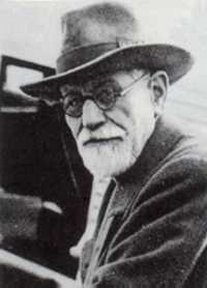
Sigmund Freud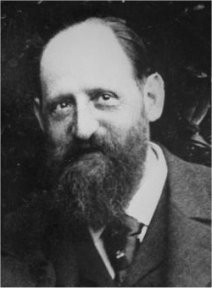
Joseph Breuer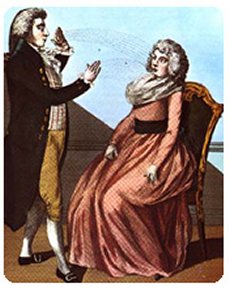
Anton Mesmer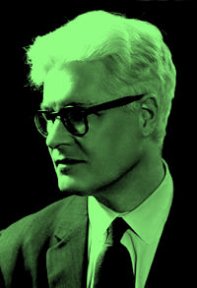
Henri F. EllenbergerPsychology per se probably began with Anton Mesmer and his rediscovery of hypnotism then known as Animal Magnetism and then Mesmerism. The discovery of hypnosis was in fact the discovery of the subconscious which was then called the unconscious. The unconscious is the basis of psychology. It was the investigation of the unconscious that led to everything else. Thus psychology takes its form from suggestion and hypnosis. Whatever you can get into the subconscious will be realized thus the importance of the properly placed suggestion. All is suggestion.May I refer the reader to Henri Ellenberger's The History Of The Discovery Of The Unconscious? Ellenberger's understanding of the study of the unconscious is unparalleled. You must have the patience to read a thousand pages. I follow the literary approach to the subject. As Ellenberger points out the Baroque Era was followed by the Enlightenment and the Enlightenment by the Romantic Era, then the Positivist approach melding into the Scientific running concurently with the Neo-Romantic.
The Enlightenment essentially dispelled the notion of the supernatural that had prevailed since man’s mind first jelled. The elves and fairies and elementals were consigned to oblivion as, indeed, was God. However, man's mind doesn't purge itself of the past so easily. So, in the reaction to the Enlightenment the Romanticists sought to revive the supernatural. The Romantics originated in and were most developed in Germany. Mesmer was already afoot so their romances were often quite psychologically penetrating. Freud was well read in the period. La Motte De La Fouquet, a Huguenot emigre from France, wrote an astonishing quartet based on the Elementals and psychology. Charles Nodier wrote the charming Trilby about a Scottish elemental that was very influential on the writings of the Neo-Romantic George Du Maurier. And of course the absolutely astonishing, even astounding, ETA Hoffman on whose stories Offenbach based his musical The Tales Of Hoffman. Sort of perverted gothic amazing stories based on psychological ideas overlooked by everyone but Freud. The Romantics produced the most wonderful of all literature.
The rational reaction to the Romantics, the Positivists, ran through mid-century into Darwin and full blown Science to be mixed with the next supernatural reaction, the Neo-Romantics of which Freud was one.
The Neo-Romantics forced to deal with scientific realities that hadn’t existed fifty years or so before couldn’t return even to the neo-spiritualism of the Romantics so they were forced to blend science and the supernatural hence we have spiritism, spiritualism, Theosophy, mediumship, channeling. Organizations such as the Society For Psychic Research, which by the way, Freud eventually joined, were formed to investigate the ex-supernatural now known as the ‘paranormal.’
Thus the ideas that Freud appropriated came from this body of ideas emanating from Anton Mesmer, and accumulating into this amorphous pool of knowledge and speculation say from 1860 to 1900. It was all there for Freud to pick and choose from as he and Joseph Breuer began to organize their ideas on hysteria. In 1895 the two published their book, Studies In Hysteria to be followed five years later by Freud’s solo effort The Interpretation Of Dreams. Whether or not Freud drew on previous dream theorists, which he did, he organized his material into a system that could be developed. The Interpretation Of Dreams is about seventy percent correct. The Dream book was based on what was the first recorded instance of psychological self-analysis which from my point of view is its main value.
Now, Freud began by studying hypnosis at both the main schools, the Salpetriere and Nancy. He began by actually hypnotizing his subjects. He then abandoned hypnosis per se for another form he called free association. In other words, he realized that a subject didn’t have to be hypnotized to access his sub-conscious. In the proper environment if the subject were allowed to ramble, psychobabble, he would begin to dredge up his subconscious fixations or what the French researcher, Pierre Janet, called idees fixe; some troubling incident that was so traumatic that it became fixed in the subject’s mind influencing and controlling his actions.
If the fixation could be brought to the surface and recognized its influence evaporated into the nothingness that it was. Whether Freud understood it or not he discovered the basis of suggestion and hypnosis. The post-hypnotic suggestion is merely an artfully implanted 'artificial' fixation. That's all psychology is. The main thing is to create defenses against unwanted suggestion and subsequent fixations.
Freud at that point had all the essentials of psycho-analysis. Now we encounter the motivations of Herr Doktor Professor Freud which have nothing to do with science and everything to do with religion.
As unpleasant as it is to introduce such a topic into the discussion it is also unavoidable since it was the controlling aspect of Freud's own psychology; it is necessary to mention that he was Jewish. As a Jew he had conceived a deep seated hatred of European civilization with the desire to destroy it. Lacking force he had to use guile. Thus while expressing a distaste for what Europeans called morals he set out to destroy them and replace them with his own image and that of his faith.
To correct a commonly held belief, Freud did not create psychoanalysis from whole cloth nor did he discover the unconscious. Psychology was being patiently investigated with fact being added to fact. So-called sexology was already established before Freud. He even acknowledges this while telling you that his Three Essays On The Theory Of Sexuality are based on their writings and not his own independent research. In the first note on page one of the Three Essays he says:
The information contained in this first essay is derived from the well-known writings of Krafft-Ebing, Moll, Moebius, Havelock Ellis, Scherenck-Notzing, Lowenfeld, Eulenberg, Bloch and Hirshfeld, and from the Jahrbuch Fur Sexuelle Zwischenstufen, published under the direction of the last named author. Since full bibliographies of the remaining literature on the subject will be found in the works of these writers, I have been able to spare myself the necessity for giving detailed references.So we are told explicitly that Freud is interpeting the work of others while adding his own opinions giving their investigations his own imprint.What Freud did was to make sweeping generalizations unsupported by any science. Having pre-empted essentially psychology Freud then created an Order whose business it was to make Freud’s opinions, for that’s all they were, orthodox while sealing off further investigation. Thus Freud's vision of the unconscious became the orthodox view that couldn’t be challenged while all further investigation was suspended.
Once his notion of psychology became orthodox then its tenets, suggestions as it were, had to be realized. This effect was captured brilliantly by Fritz Lang in his silent films Mabuse, The Gambler (1923) and The Testament Of Dr. Mabuse (1933). In those movies Dr. Mabuse was placed in an insane asylum after failing in his attempt to overthrow society in 1923 where he was catatonic for a number of years, then he sat up and began writing his manifesto or testament that hypnotized the asylum director, Dr. Baum, who then set Mabuse’s plans or suggestions in motion.
In reality Freud completed his psychology by about 1915. At that time he commenced his meta-psychological writing to direct his goals into reality a la Mabuse, that is the destruction of Euroamerican ideals to be replaced by the Hetaeric ideals of his Jewish sect of Sabbatians.
Thus Freud’s Three Essays On The Theory Sexuality of 1905, translated into English in 1910. In the essays Freud undermined European notions of morality by justifying homosexuality the other perversions, suggesting the idea of child sexuality, discouraging the idea of chastity and the control of the sexual impulses which as Haggard said were formed for the purpose of creating a just society.
While Freud said that he abandoned hypnosis before 1900 in fact he probably realized the relation between suggestion and implementation. He must have known that all you have to do is get the suggestion in the mind and that they will then be acted upon. Hence Freud was associated with the B’nai B’rith from 1895 on. They must have discussed how to and been in collaboration to overthrow Western society. Thus in 1913 B’nai B’rith established the Anti-Defamation League in the US with its suggestions of anti-Semitism and anti-Semite with their paralyzing effect on Westerners.
Thus the Three Essays are three suggestions that would have certain corrosive effects if ingested, as they were. He was successful in implanting the suggestions, in other words having them taken seriously and then acted upon. That is not to say there wasn’t resistance, as Freud knew resistance was natural.
Freud’s goals were not scientific but religious in nature. He shaped whatever science he had to use to further his religious goals. Freud well understood that just as individuals have repetition compuslsions so do cultures. The complete future history of a culture can be determined by its founding myths. There can be no question but that Freud trimmed and conditioned his own Jewish culture to realize Jewish goals as set out clearly in Genesis within the limits of the Jewish psyche. If one reads the Pentateuch, the five books of Moses, what one has is a complete history of the world with a beginning, middle and end. The projected End Days occured with the transit from the Age of Aries to that of Pisces. At the time the notion of the End Days was taken very literally. That it didn’t happen as was expected required explanations that have confused the issue since extending the notion of the End Days down to our times with it resultant confusion of the West.
Then, following a cultural repetition compulsion as well as a personal one, Freud created a closed end psychology to which further development was denied. And he guarded against any attempts to do so expelling from his Order any who violated orthodoxy, then pursuing them with a vengeance to discredit them.
While his psychology was rejected by many Europeans as ‘Jewish psychology’ and was met with stiff resistance his fellow religionists understood the tools he was providing for their benefit and utilized them. Movements such as Dada, Critical Theory, and Primal Therapy arose.
Perhaps the most significant of these organizations arose in the United States under the guidance of Freud’s nephew, Edward Bernays. Bernays was the son of Freud’s wife, Martha Bernays’, brother and Freud’s sister Anna. Bernays family emigrated to America in 1892. After the Great War he became a Public Relations and advertising expert.
To quote Wikipedia:
As a Jew who had witnessed the critical role that propaganda and mass media had played in creating anti-German sentiment in Britain prior to WWI and again during and after the Nazi’s pseudo-democratic rise to power in Europe, Bernay’s felt that the same unleashing of irrational animosity could happen in any democratic society. According to the BBC interview with Bernays’ daughter Anne, Bernays felt that the public’s democratic judgment was “not to be relied upon” and he feared that (the American public) could easily vote for the wrong man or want the wrong thing, so that they had to be guided from above.Bernays’ public relations efforts helped to popularize Freud’s theories in the United States. Bernays also pioneered the PR industry’s use of psychology and other social sciences to design its public persuasion campaigns.“If we understand the mechanism and motives of the group mind, is it not possible to control and regiment the masses according to our will without their knowing about it? The recent practice of propaganda has proved that it is possible, at least up to a certain point and within certain limits.”
Bernays referred to his technique of opinion moulding the ‘engineering of consent.’
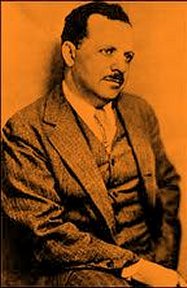
Edward Bernays - The Great ManipulatorNow, the above quote raises the question of whose will is ‘our’ will. Who is this ‘we’, Mr. Bernays?
To achieve his goals Bernays needed unlimited access to the media. He found this by welding Freudian ideas of conditioning and indoctrination to the advertisement of commercial products such as cigarettes. Thus in order to extend the market for Lucky Strike cigarettes he corrupted an unexploited segment of the public, women. Women were not smokers at the time so Bernays devised methods to eliminate women’s resistance to smoking. Thus ‘we’ used the democratic right of free speech or expression to undermine it. Who’s evil here? He used his ‘guidance from above’ to betray his trust. Nowadays, of course, his work is being undone by those who find smoking evil and by extension, Bernays. So, in a way the democracy overturned divine ‘guidance from above’ in this situation.
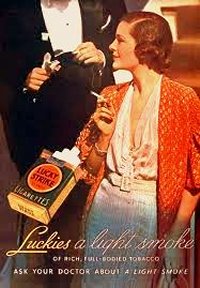
Light Up Girls.The rise of Hitler while on the one hand disastrous for some Jews was extremely beneficial for the rest in both the short and long term. The Jewish intelligentsia including Freud was driven from Europe by Hitler. Most came to the US where they found a congenial reception from fellow Jews in the great cultural centers of NYC and LA. Between the two cities the culture of the US has been determined. Publishing and the theatre in NYC and the movies in Los Angeles.
The psycho-analysts set to work to fasion movies that made sure that ‘our’ goals were furthered and the feared people subverted. Sex was the lubricant.
Now, the European morality Freud despised was based on the conscious mind controlling errant impulses toward evil. At the time the morals were developed the unconscious was known as Satan so the idea was to put Satan behind you. Freud severed the relation between the conscious and unconscious minds placing the emphasis on the unconscious or Satanic desires. He said that the unconscious was all important while the influence of the conscious was trivial.
In point of fact a healthy unconscious unites with a healthy conscious to form a healthy mind. The problem is to eliminate ‘viruses’ or fixations in the subconscious while creating a healthy moral mind to integrate the personality. This has been the goal of mankind from the beginning.
It seems impossible that Freud didn’t realize this. Instead he emphasized a demented sexual approach in which the more sexual intercourse you had the better a person you were. Easily shown as nonsense.
Freudian promotion of the unconcious rapidly brought a change in sexual attitudes aided by suggestion on the radio, TV and in movies but more especially by anti-biotics and the contraceptive pill. Thus by the sixties sexual abandon was the rule in New York City’s Bohemia.
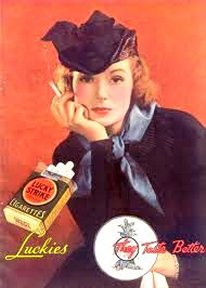
The First One Is FreeWhile Burroughs and Wells can be associated there is no direct evidence that the first two ever met the last although it seems very probable that Wells would have made an effort to meet Freud. Burroughs, of course, never went to Europe. However, both Wells and Burroughs were affected by Freudian psychology. Wells especially tried to incorporate Freudian psychology into his work. As to Burroughs, well, let us look at his sexual views in Part IV.
|
|
|
|
|
R. E. Prindle welcomes your comments
at:
dugwarbaby@yahoo.com
|
and Follow the Navigation Chart for the Entire Series of Articles |
|
Differing viewpoints are welcome. |
|
are not necessarily those held by Edgar Rice Burroughs, Inc. |
![]()

![]()
BILL
HILLMAN
Visit
our thousands of other sites at:
BILL
AND SUE-ON HILLMAN ECLECTIC STUDIO
ERB
Text, ERB Images and Tarzan® are ©Edgar Rice Burroughs, Inc.-
All Rights Reserved.
All
Original Work ©1996-2010/2013 by Bill Hillman and/or Contributing
Authors/Owners
No
part of this web site may be reproduced without permission from the respective
owners.